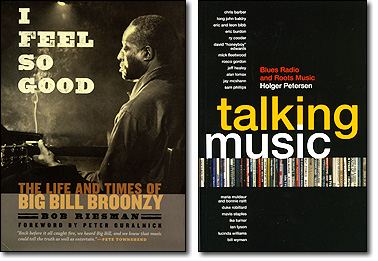 |
|
|
|
|
| A Review of Two Books:
I Feel So Good: The Life and Times of Big Bill Broonzy, and Talking Music: Blues Radio and Roots Music |
|
Bob Riesman, I Feel So Good: The Life and Times of Big Bill Broonzy. Chicago: The University of Chicago Press, 2011. Holger Petersen, Talking Music: Blues Radio and Roots Music. London, Ontario: Insomniac Press, 2011. |
|
Bob Riesman is co-editor of Chicago Folk: Images of the Sixties Music Scene: The Photographs of Raeburn Lerlage. He produced and co-wrote the television documentary American Roots Music: Chicago and was a contributor to Routledge's Encyclopedia of The Blues. His book, I Feel So Good, as its subtitle suggests, is concerned with the life and times of Big Bill Broonzy. The book is very wide in scope, dealing not only with the detail of Big Bill's life but also placing it firmly in the broader context of American jazz, blues, and folk music. The book should be of interest to Chris Barber fans, both because Broonzy was one of the first North American artists with whom the early Chris Barber Band played and, along with Ottilie Patterson, acknowledged as a major influence on their music. Indeed, Ottilie wrote in the liner notes of her LP Back In The Old Days that her most treasured possession was a 1955 letter from Big Bill Broonzy, in which he wrote, "Keep up the good work for me. I know you can do it." Beyond this general context of the influence of Broonzy on British music in the mid-1950s there are specific instances in which Chris Barber appears in the book (indicating, incidentally, that Bob Riesman's research went well beyond the confines of the United States; unfortunately this rarely happens in American books about American music). There is, for example, a detailed account of the Chris Barber Band in its early days, of skiffle, Lonnie Donegan, and of the Band's relationship with Big Bill Broonzy, recounting the sad story of record producer Denis Preston's unwillingness to record the Band and Broonzy together, despite their have been on tour together and being thoroughly familiar with each other's music. Not surprisingly, this theme is repeated in part of Holger Petersen's interview with Chris in Talking Music. Petersen is one of the best-known figures on the Canadian music scene: he is a veteran broadcaster whose weekly Saturday Night Blues on CBC Radio has been a fixture on the network for twenty-five years. His CKUA (Alberta) show, Natch'l Blues, has been aired every week for more than forty years. Petersen also runs his own label, Stony Plain Records, which is partly why he came to interview Chris in Toronto in 2005 when Chris made a short trip to Canada to play and record with Jeff Healey's Jazz Wizards, the recording subsequently being released on the Stony Plain label. In fact, the Chris Barber interview is the first to appear in the book, tacitly recognizing the importance of Chris's roles, both direct and indirect, in fostering enthusiasm for the blues both nationally in the UK and overseas as well, not least back in the United States and Canada. While it is the Barber interview that will appeal most directly to Barber fans, there is a great deal of other material in Talking Music about musicians and singers with whom Chris has had a relationship, either by influence or by direct partnership. For example, immediately following Chris's interview is a chapter on Long John Baldry, who was associated with Chris Barber and Ottilie Patterson in the early-1960s before he emigrated to Canada, and then there is Bill Wyman, who has not only publically stated his appreciation of Chris's influence on British blues and popular music but who was also a guest player at Chris's 75th birthday concert in Liverpool in 2005. Talking Music should also have broad appeal to anyone interested in contemporary blues and roots music. Its other interview subjects include Eric Burdon, Ry Cooder, Mick Fleetwood, Jeff Healey, Bonnie Raitt and Maria Muldaur, to name just a few. Taken together, these two books are important additions to the literature about jazz and blues and - of immediate interest to Chris Barber fans - provide some new insights into Chris, Ottilie and the Band in the development of and appreciation for jazz and blues world-wide. Ed Jackson, November 2011 |
|
| |
